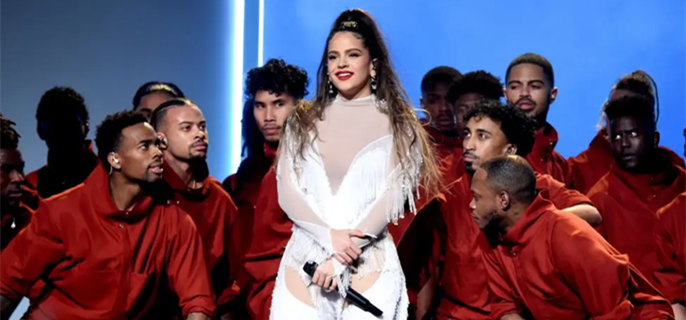In her fleeting discography, Rosalía has never encountered a convention she hasn't dared to break. Born in Barcelona, the singer has spent the past seven years innovating at a pace that makes her contemporaries seem comically complacent. Her breakthrough album, El Mal Querer (recorded as her graduate thesis in 2018), took the folkloric traditions of Flamenco and fused them with addictive R&B rhythms. The follow-up, 2022's Motomami, was a wildly innovative pop smash, twisting Latin American genres like cumbia and reggaeton around glitchy hip-hop beats and her playful, sinuous melodies. With lyrics about fame, sex, and self-discovery, Motomami debuted at the top of Spotify's global albums chart, won album of the year at the Latin Grammys, and became 2022's best-reviewed record on Metacritic - even topping Beyoncé's celebrated Renaissance.

After Rosalía's critically acclaimed tour ended three years ago, her fans were left wondering where she'd go next. The answer is revealed on her fourth album, Lux, released on Friday. Rather than following in the footsteps of its predecessors, Lux carves its own unique path - harnessing Rosalía's classical training at the prestigious Catalonia College of Music. Recorded with the London Symphony Orchestra and featuring multiple arrangements from Pulitzer Prize winner Caroline Shaw, it's a radical, rebellious operatic opus that sounds like nothing else in the pop sphere.
The lead single, Berghain, riffs on Verdi's Dies Irae, with strings played like serrated knives as a German chorus chants about fear and anger, until Bjork arrives to inform everyone, "the only way to save us is through divine intervention." Another early highlight, Reliquia, chops and splices a chamber quartet into unrecognizable electronic patterns as Rosalía reconciles herself to the idea that she loves too hard and locates the beauty in that vulnerability. "Take a piece of me, keep it for when I'm gone / I'll be your treasure, I am your relic."
Fellow pop iconoclast Madonna has already declared herself a fan, posting a message to Rosalía on Instagram saying, "I can't stop listening! You are a true visionary!!!" Pieced together over three years, Lux reflects on a period of personal and professional upheaval for the 33-year-old. In that time, Rosalía broke off her engagement to Puerto Rican reggaeton star Rauw Alejandro, ditched her management in favor of Adele's manager, Jonathan Dickins, and landed her first major acting role in the teen drama Euphoria.
The split from Alejandro seems to inspire the record's most barbed lyric. La Perla is aimed at a man she calls an "emotional terrorist" and "the Olympic gold medalist of sons of whores" with a jaunty waltz arrangement that suggests she's thoroughly enjoying her litany of insults. The cathartic Focu 'Ranni (only available on CD and vinyl copies) pairs a desolate melody with a scrambled vocal sample reflecting the emotional turmoil of a bride who calls off her wedding at the last moment. In an interview with France's Le Monde, she said the song was inspired by her namesake, Saint Rosalia de Palermo, who fled the altar to dedicate her life to God. "I found that coincidence pretty insane," the star added but refused to elaborate further saying it was a "long story."
The quest for spiritual fulfillment underscores the rest of Lux - whose title is the Latin word for "light." Sauvignon Blanc is a gossamer ballad that contains the self-deprecating pledge: "I will listen to my God / I will throw away my Jimmy Choos." While the dazzling dopamine rush of Divinize finds her burdened with glorious purpose: "Bruise me up, I'll eat all of my pride / I know that I was made to divinize." But it's the more reflective moments that steal your breath. The closing track, Magnolias, is a delicate acceptance of death: "What I never did in my life, you'll do when I'm dead." And the tender, subdued La Yaguar is an acknowledgement of the divine on earth that celebrates our shared humanity: "I fit in the world / And the world fits into me / I take up the world / And the world occupies me," she sings in wide-eyed wonder. The song ends with a recording of Patti Smith in 1976 encouraging artists to shatter expectations: "Break on through to the other side," the rock star exclaimed. "Going through one door isn't enough; a million doors aren't enough." As an encapsulation of Rosalía's creative impulse

